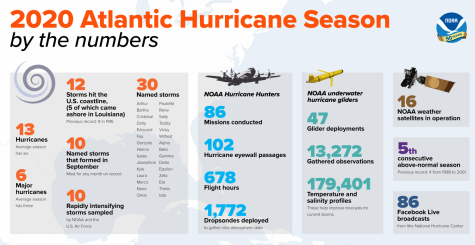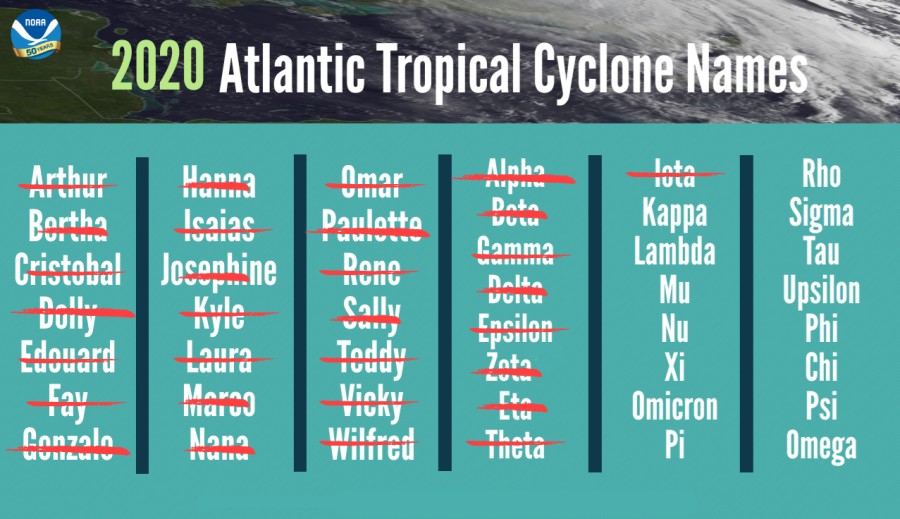A Look Back at the 2020 Hurricane Season
December 23, 2020
The year 2020 has been like no other. Aside from all of the ways that the world has been changing, people often overlook the severity of the environmental crises we face. One such involves the climate, and the way that it has changed over the years.
The 2020 hurricane season shattered previous records, only increasing scientists’ concerns. According to the National Oceanic and Atmospheric Administration, (NOAA), in the 2020 hurricane season- which lasted from June 1 to November 30- 30 storms were named. 13 of these storms became hurricanes, and of these 13, 6 developed into major hurricanes.

This is the fifth year in a row where there was an above-normal Atlantic hurricane season. One factor that scientists believe has contributed to this abnormal season, similar to many other seasons, is Atlantic Multidecadal Oscillation, (AMO). AMO is a series of changes in the sea surface temperature of the North Atlantic Ocean. These changes are natural, although more research is needed to determine
whether or not these changes are related to global warming. Of equal importance, Atlantic Multidecadal Oscillation is caused by the circulation of water and heat in the Atlantic Ocean. During warmer phases of AMO, the amount of tropical storms that strengthen into stronger hurricanes is greater than that during cooler phases. Since hurricanes require warmer water temperatures, Atlantic Multidecadal Oscillation has been attributed to the overly-active 2020 hurricane season.
However, while AMO can affect the hurricane season, global warming is often stated to do so, too. According to Jim Kossin, an atmospheric research scientist at NOAA’s Center for Weather and Climate, there is a general idea that global warming increases the intensity of storms, but no data to prove that global warming increases the frequency of storms. In addition to this, Kossin notes that because global warming has not been seen as the cause for increased frequency of storms, there is a good chance that continued global warming will not increase the number of storms. With this being said, however, because global warming is oftentimes attributed to stronger storms, continued global warming is expected to increase the severity of storms. Due to these discrepancies, scientists are continuously collecting data and conducting research, in order to better understand these topics.
In respective terms, according to Gerry Bell, a seasonal hurricane forecaster at NOAA’s Climate Prediction Center, “As we correctly predicted, an interrelated set of atmospheric and oceanic conditions linked to the warm AMO were again present this year. These included warmer-than-average Atlantic sea surface temperatures and a stronger west African monsoon, along with much weaker vertical wind shear and wind patterns coming off of Africa that were more favorable for storm development. These conditions, combined with La Niña, helped make this record-breaking, extremely active hurricane season possible.”

Thus, while the overly-active 2020 hurricane season has come to a close, bringing about catastrophic damage, and taking several lives, scientists are continuing to study the oceans, which will therefore allow them to track and predict hurricanes. More research and data will also better allow us to understand hurricanes, as there are many things that scientists do not know. Now, as we wait for the 2021 hurricane season, we will eventually learn how much worse the hurricane seasons could potentially become.
Works Cited
NOAA. Record-breaking Atlantic Hurricane Seasons Draws to an End. NOAA, 24 Nov. 2020, https://www.noaa.gov/media-release/record-breaking-atlantic-hurricane-season-draws-to-end#:~:text=The%20extremely%20active%202020%20Atlantic,to%20develop%20past%20that%20day. Accessed 20 Dec. 2020.
NOAA. A NOAA Expert Answers Our Questions About the Historical 2020 Hurricane Season. NOAA’s National Environmental Satellite Data and Information Service, 30 Nov. 2020, https://www.nesdis.noaa.gov/content/noaa-expert-answers-our-questions-about-historical-2020-hurricane-season. Accessed 20 Dec. 2020.
NOAA. Frequently Asked Questions about the Atlantic Multidecadal Oscillation (AMO). NOAA’s Atlantic Oceanographic and Meteorological Laboratory, 09 Nov. 2005, https://www.aoml.noaa.gov/phod/amo_faq.php. Accessed 20 Dec. 2020.
